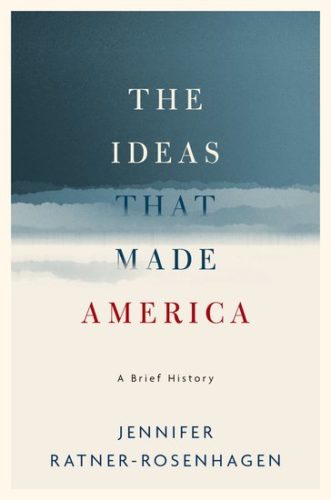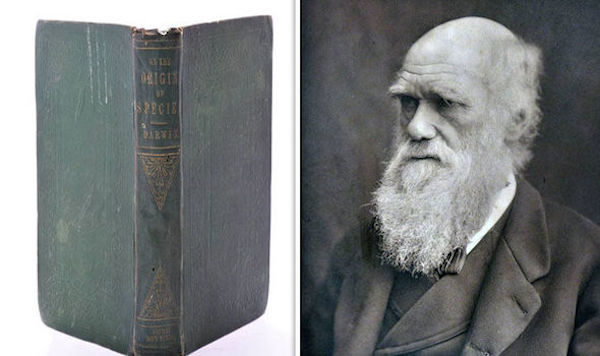Book Review: “The Ideas That Made America” — Not Made in America
By Blake Maddux
Jennifer Ratner-Rosenhagen’s The Ideas That Made America provides an exciting, if quicksilver, tour through intellectual history.

The Ideas That Made America: A Brief History by Jennifer Ratner-Rosenhagen. Oxford University Press, 220 pages, $18.95.
Although the point isn’t made explicitly, the most important takeaway from Jennifer Ratner-Rosenhagen’s new book might be that the ideas that made America were often not ideas made by Americans.
Ratner-Rosenhagen is a professor of history at the University of Wisconsin-Madison. She received her Ph.D. from Brandies University and was a fellow at the Radcliffe Institute for Advanced Study during the 2014 academic year. Her previous book, which was also her first, was the award-winning American Nietzsche: A History of an Icon and His Ideas (University of Chicago Press, 2012).
In The Ideas That Made America she explains that the goal of intellectual history is “to understand where certain persistent concerns in American thought have come from” and “to comprehend how [historical] actors came to their understanding of their world and their role in it.” She refers to this as “eavesdrop[ing] on the past” and demonstrates “that thinking is where so much of the historical action is.” The suggestion is that ideas can be as powerful in fashioning the course of history as war and public policy.
As an example, Ratner-Rosenhagen quotes John Adams on the American colonies’ determination to break free from Britain: “The Revolution was effected before the war commenced. The Revolution was in the minds and hearts of the people.” Most important in shaping the outlook of the people, the author argues, was Thomas Paine’s Common Sense. The pamphlet contained “the convulsive power to break history in two” and “made dreams of independence appear eminently possible.” She concludes, “Looking at the American Revolution through the lens of intellectual history helps draw out the importance of ideas for motivating colonists to take up arms….” Ratner-Rosenhagen notes that Paine had arrived in America from England only 13 months prior to the publication of his history-making booklet. Thus, he was, for all intents and purposes, a European.
Common Sense is the first of several texts that Ratner-Rosenhagen credits with having such a seminal impact. Of 1859’s On the Origin of Species, she writes, “Prior to Darwin, most educated people in America and Europe believed that God created the universe, with each species as it was when he first made the earth.” Less than twenty years later, however, “a leading paleontologist would announce that ‘to doubt evolution to-day is to doubt science’.” In the book’s final chapter, she points to the mind-changing power of MIT professor Thomas S. Kuhn’s 1978 book The Structure of Scientific Revolutions: “By dismantling science as a domain of absolute truth, Structure sparked an intellectual revolution of its own, accrediting antifoundationalist ideas that would become the opening salvo of late twentieth century American postmodernism.”
Interestingly, neither Paine, whose ideas almost literally “made America,” nor Kuhn is the book’s most prominent figure. Neither are any of the Founding Fathers, Transcendentalists, abolitionists, pragmatists, or civil rights leaders. In fact, the major figure is not an American at all, but an Englishman who never once visited the United States: Charles Darwin. Undermining the notion that all creatures were present at God’s creation in their final form was an immense revelation. Origin’s reach proved to be far more multifaceted than scientific.
“Darwinism,” according to Ratner-Rosenhagen, “had a much immediate and transformative effect in the realm of social ideas.” This influence manifested itself in the form of Social Darwinism, which is often summed up as “survival of the fittest,” the handy phrase coined by British (read: European) polymath Herbert Spencer in his 1864 text Principles of Biology. If species in nature go extinct because they are unable to adapt to their environments, perhaps the same idea applies to the human social and economic realms, which were changing at a rapid pace because of industrialization. Ironically, “Darwin considered…‘Social Darwinism’ anathema and distanced himself from Spencer’s advocacy of the ‘survival of the fittest’.”
Predictably, evolution and Spencer’s interpretation of Darwin wormed its way into the debate over slavery. “For many abolitionists, Charles Darwin’s ideas proved…that black people were no more animals than white, and that both shared a common origin and therefore deserved the same destiny as free people,” Ratner-Rosenhagen asserts. “[P]roslavery advocates,” meanwhile, “used Darwin’s ideas to prove that even in a democracy, ‘survival of the fittest’ was the law of the land….”
Darwinism’s ascendancy continued unabated as the nineteenth century became the twentieth. Although it arrived too late to influence the first major American philosophical system, Transcendentalism, it profoundly impacted America’s other “most important and influential tradition,” pragmatism. Ratner-Rosenhagen argues that “pragmatist philosophers believed that notions of mind and morals could no longer be based on timeless foundations, because, as they learned from Darwin, no such things existed.” In fact, John Dewey, “whose ideas had the widest influence on twentieth-century American intellectual life,” wrote a 1909 essay called “The Influence of Darwin on Philosophy.”
Of course, well prior to the War for Independence, Europeans already had cast a powerful spell on American thinkers.
Writing of pre-18th century America, Ratner-Rosenhagen observes, “to talk of something like an ‘American intellectual life’ in this era is to talk rubbish. In the minds of the earliest settlers and colonizers they did not belong to ‘America’ but rather to their home countries and to their local companions in their tiny enclaves … Just as they had no connection to something called ‘America,’ they also had no shared set of ideas or beliefs, no shared loyalties, because they had no common nationality, religion, or historical memory.”
Citing a specific example, she says of John Winthrop and his 1630 sermon “Model of Christian Charity” that he “did not write this text as an American, but as a Puritan.” In the 1770s, “American revolutionaries…imagined a classical past as a guide to a future America,” which they filtered through their fondness for more recent thinkers like Montesquieu and John Locke.

Bypassing the already discussed age of Darwinism, the early 20th century was a time in which intellectuals took on a greater public, most activist role. Ratner-Rosenhagen writes that “intellectuals found this opportunity to directly help their fellow Americans in Franklin Delano Roosevelt’s New Deal reforms.” Many such thinkers lived in America, but only because they had fled the horrors of Nazi Germany.
So it was, Ratner-Rosenhagen attests, that “the massive immigration of German-speaking intellectuals, artists, and scientists…had an enormous influence on American academic and cultural institutions … In addition, the new crop of highly trained social scientists was seen as a valuable research resource for the development and administration of the New Deal….” Their influence did not end there: “the emigres’ theories of mass society became widely read and popularized as Americans sought to comprehend the dynamics of Cold War geopolitics abroad and observed dangerous mass tendencies hiding behind atomistic individualism at home … Thus, the mass emigration of European intellectuals in the 1930s and 1940s had dramatic long-term effects on the shaping of American thought in the postwar period.”
Meanwhile, the postwar existentialists who still called the continent their home did not go unnoticed. Richard Wright, author of the novel Native Son and the memoir Black Boy “began reading works by Heidegger and Kierkegaard, which in turn became gateway drugs to other existentialists….” He also “became good friends with Simone de Beauvoir and Jean-Paul Sartre” before relocating to Paris in 1947. (In the case of Dr. Martin Luther King Jr., it was neither an American nor a European, but India’s Mahatma Gandhi who influenced his practice of passive resistance.)
The power of European ideas generated fresh fears in post-WWII America. The appeal of French “intellectual superstars” such as Jacques Derrida and Michel Foucault led “worried observers [to sound] the alarm that a ‘foreign invasion’ was infecting the academy.” University of Chicago classicist Allan Bloom, author of The Closing of the American Mind, pronounced that Americans’ acceptance of “no fault divorces,” “conflict resolution,” and “political correctness” was evidence that they were, in Ratner-Rosenhagen’s words, “becoming too distrustful of moral authority” and “deploying a dumbed-down ‘value relativism’ from Europe.” In doing so, Bloom directly linked the power of ivory tower dwellers to what he saw as the decadent behavior of everyday Americans. By suggesting that this dissolution was somehow largely the fault of Friedrich Nietzsche’s amoralism, he underscored the sway that continental influencers had over the ideas that continued to make America.

Historian Jennifer Ratner-Rosenhagen — for her, ideas can be as powerful in fashioning the course of history as war and public policy.
Jennifer Ratner-Rosenhagen’s The Ideas That Made America provides an exciting, if quicksilver, tour through intellectual history. Covering so much ground over 180 pages means that major figures, such as Margaret Fuller, Henry David Thoreau, and Frederick Douglass, receive somewhat perfunctory treatment. James Madison — the so-called Father of the Constitution — is inexplicably mentioned only once. Furthermore, it seems a bit strange for a rising academic star to follow-up such a well-received first book with a compact survey instead of another perspicacious monograph. (It’s similar to a band releasing an EP of live versions and B-sides in the wake of a ballyhooed debut.)
Still, readers will be gratified to be introduced to lesser known but provocative figures, such as Randolph Bourne, an early 20th century thinker/journalist. Also, Ratner-Rosenhagen is savvy enough to serve up some entertaining snark, e.g., “Jefferson drafted these words [doubting the morality of slavery] while an army of slaves served his every physical need” and of Benjamin Franklin, “while he extolled independence, he had a virtual staff of loved ones and subordinates to help him cultivate his self-reliance.” Finally, the book laudably succeeds at its challenging ambitions; in some ways, writing a “brief history” of several centuries is more challenging than writing a long one.
Blake Maddux is a freelance journalist who regularly contributes to the Arts Fuse, the Somerville Times, and the Beverly Citizen. He has also written for DigBoston, the ARTery, Lynn Happens, the Providence Journal, The Onion’s A.V. Club, and the Columbus Dispatch. A native Ohioan, he moved to Boston in 2002 and currently lives with his wife and one-year-old twins–Elliot Samuel and Xander Jackson–in Salem, Massachusetts.


Does Ratner- Rosenhagen really suggest “that ideas can be as powerful in fashioning the course of history as war and public policy? ” If she does she’s missed the point that ideas shape public policy. If she doesn’t she’d been misread by the reviewer.